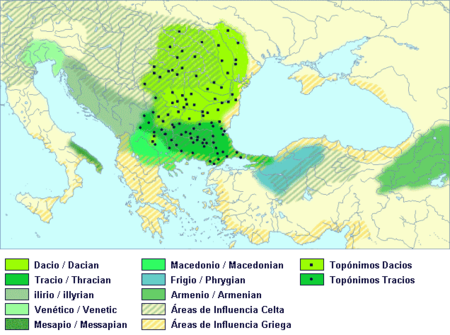Phrygian language
The Phrygian language was the language of the Phrygians, a people who migrated from Asia Minor to Thrace around 1200 BC. c.
By the VI century, it was already extinct, but we can reconstruct some words with the help of some inscriptions engraved with a script similar to that of Greek.
It is believed that it had similarities with Thracian and Armenian, and that at the same time it would have had some characteristics of Greek, a language with which it was in contact for some time.
Historical, social and cultural aspects
Historians of antiquity and myths sometimes associate Phrygian with Thracian, and even with Armenian in some classical sources. Herodotus collects the Macedonian story that tells that the Phrygians emigrated to Asia Minor from Thrace (7.73). Later in the text (7.73), Herodotus affirms that the Armenians were colonized by the Phrygians, this occurring in the time of Xerxes I. The first mention of the Phrygian in Greek sources, in the Homeric Hymn to Aphrodite, which describes as different from the Trojan. Unfortunately, little is known about the Trojan, although certain evidence has led to speculation about its possible relationship with the luwita.
Registration
Phrygian is attested by two linguistic corpora, one from around 800 B.C. and later (Paleophrygian), and then, after a period of several centuries, at the beginning of the I century d. C. (Neo-Phrygian). The Palaeo-Phrygian corpus is divided (geographically) into the Midas city inscriptions of the city (M, W), Gordión, Central (C), Bithynia (B), Pteria (P), Tyana (T), Daskyleion (Dask), Bayindir (Bay), and "various" (Dd, various documents). The Mysian inscriptions appear to be in a language related to the Mysian language (in an alphabet with an additional letter, "s misia").
It survived at least into the VI century AD. C. We can reconstruct some words with the help of some inscriptions with bilingual texts in Greek.
Linguistic description
Classification
The Phrygian language was probably related to Thracian, Armenian, or Greek. In most cases the Phrygian language used an alphabet derived from the Phoenicians. The inscriptions available in the Phrygian language have not yet been translated. Inscriptions using a script close to Greek have been translated, and part of the Phrygian vocabulary has been identified.
Grammar
Regarding its structure, what can be recovered from it is clearly Indo-European, with nouns declined in cases (at least four), gender (three) and number (singular and plural), while verbs they are conjugated by time, voice, mode, person and number. There is not a single word that attests to all its bending forms.
Many Phrygian words are very similar to the reconstructed Proto-Indo-European (PIE) language. Phrygian seems to show an augmentation, as do Greek and Armenian, cf Eberet, probably corresponding to PIE *e-bher-et (Greek, epheret ).
Vocabulary
Many Phrygian words are theoretically known, however the meaning and etymologies and even the epigraphy of many Phrygian words (mostly taken from inscriptions) are still under debate.
Known Phrygian traits include:
- Ensorption of indo-European sound occlus (*b, *d, *g, *g,, *gw(p, t, k):
- PIE *d(e)iwos > guys 'god' - PIE *bhh1g̑os > bekos 'bread' - PIE *g̑enh1sa > kena 'generation' (cf. Greek génea) - PIE *gwneh2ika > knaika 'wife'.
- As in Greek, triple vocalization of indo-European larynxals in *h1 (o i ante nasal), *h2 a and3 or:
- PIE h1newn > inn 'nine'
- PIE h1regw-o > erek 'late' (Greek erebos 'darkness')
- PIE h2ster > astel 'star'
- PIE h3neh3mno > onoman 'name' (Latin nomen< h3neh3mno)
A famous Phrygian word is bekos, which means "bread". According to Herodotus (Histories 2,9) the pharaoh Psamético I wanted to establish the original language of humanity. To this end, he ordered that two children be raised by a shepherd, forbidding the children to hear a single word, and instructing him to inform him of their first words. After two years, the pastor reported that upon entering his room, the children came up to him, and stretching out their hands, said bekos. Investigating, the pharaoh discovered that it was the Phrygian word for 'wheat bread', later the Egyptians recognized the Phrygians as a nation older than theirs. The word bekos also appeared several times in Paleo-Phrygian inscriptions on funerary stelae. Many modern scholars suggest that it is cognate with English bake, bake (PIE *bheHg-).
According to Clement of Alexandria, the Phrygian word bedu (βέδυ) means "water" (PIE * Wed) appears in Orphic ritual. In the same source, the Macedonians said they worshiped a god called Bedu, which is interpreted as "air".
Contenido relacionado
Swadesh list
Gallo-Italic languages
Lusitanian language
